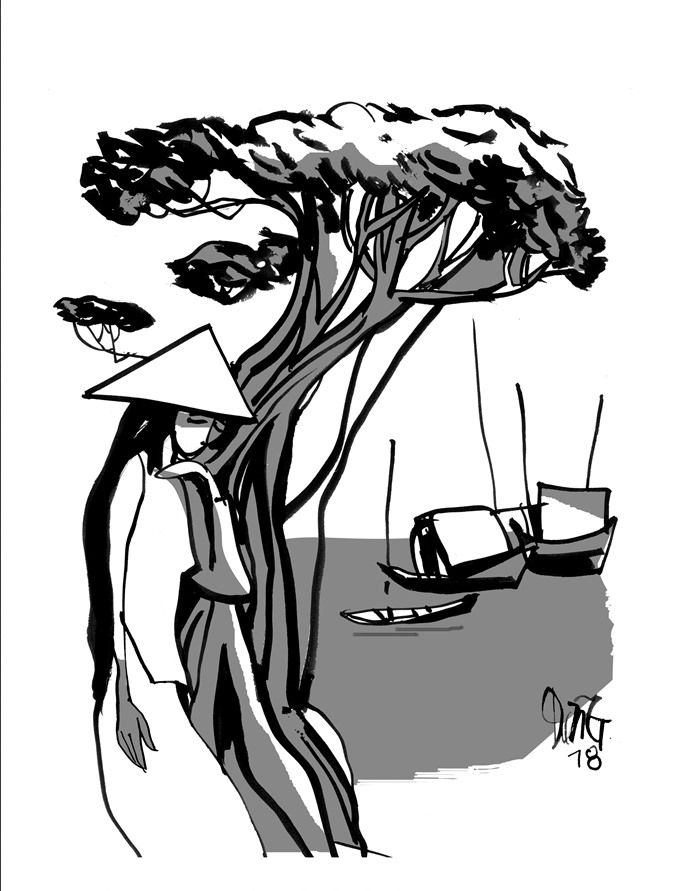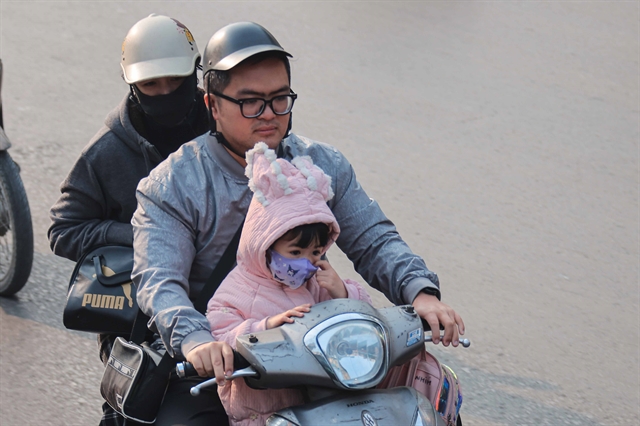

A short story by Trần Dũng
 |
| Illustration by artist Đỗ Dũng |
by Trần Dũng
Nguyên hesitantly stopped his bike at the three-way crossroads. Long Thạnh Village looked so different now. Nguyên looked around for the haggardness of more than 20 years before, but couldn’t find any trace of it.
The hot and dry north-easterly wind lent a fresh rosiness and eagerness to the coastal village. Nguyên felt glad, wondering whether he had contributed even just a little to the prosperity of Long Thạnh today. It was strange though. As a wandering journalist, rarely had he set foot in a region twice. Yet this remote land, which seemed as tiny as a little cup, kept drawing him back. The first time he was here, he exposed a ruse in which a bunch of communal cadres falsified papers to prove a man had died fighting in the American War to help his wife claim war martyr benefits. Today he returned to report on a flourishing business model which was gaining nationwide fame. Suddenly, Nguyên felt dazed. It was perhaps because of the scorching sunshine at midday by the sea. As a woman wearing a grass-green traditional southern Vietnamese garment walked toward him, Nguyên asked quickly:
- Madam! Can you tell me the way to the Curtain Fig Wharf eco-tourism zone?
- Curtain Fig Wharf? -The woman looked up, startling Nguyên. The green garment had deceived him. Under the ragged conical hat was a pale wrinkled face whose age was difficult to guess but must have been old. The strangest thing was her gleam, which was both deep and distant, which both looked at him and seemed not to look at anything in particular.
- Curtain Fig Wharf? - The woman mumbled again. - Yeah...down there at Curtain Fig Wharf!
And the woman walked straight away, leaving Nguyên standing alone puzzled in the middle of the crossroads.
*
Nguyên slept at Curtain Fig Wharf. He learned everything he needed to know for the article in one afternoon sitting with director Tâm aboard a canoe traversing up and down canals running through a row of primal mangrove forests. For a long time, he had been so busy breathlessly chasing stories as a journalist that he had rarely allowed himself moments to relax and listen to birds sing, or watch rivers run. Moreover, there seemed to be something buried deep inside the mind of the director who had pepper-and-salt hair and who hadsingle-handedly protected scores of acres of green mangrove forests against the violent giant tiger prawns.
The night at Curtain Fig Wharf felt sharply cold. The bottle of wine slowly emptied. Director Tâm said in a low voice:
- At that time, I felt like a mad man after being kicked out of career and success. But how could I have helped feeling mad. I was like a high-flying kite whose flying line suddenly broke, making it flop to the ground. Then everybody in Long ThạnhVillage vied with each other to destroy the forests to farm prawns. I didn’t have any other option but jumped in, borrowed money, hired scrapers and excavators, and hoped for a change of fate. Until one day, or to be more accurate, one night, which was also a full-moon one at the beginning of the season of north-easterly winds like tonight.
Raising the cup of wine Tâm gave him, Nguyên looked up at the sky. The full moon hung obliquely, shining through the green mangrove foliage, then floating far away into a sheer mist. Once in a while, the smoke from a mosquito burner flared up. It touched the sparkling silvery blueness of the moonlight, chased the latter around, captured it and returned it to the high sky. The night at Curtain Fig Wharf was so quiet. Nguyên could hear the buzzing of a few mosquitoes trying to fly past the smoke in pursuit of their prey. Insects chirped to each other incessantly. Big-clawed red crabs purred under the water waiting for mates. Something lighter than a leave seemed to have fallen. Tâm put his cup down, jumped up, and darted toward the river bank:
- Madam!
Nguyên was startled and followed him. He searched but didn’t see anybody. Under the ethereal moonlight, Tâm stood by the curtain fig tree, and stared into the depths, searching for something in the thin mist.
- Who are you calling? - Nguyên put a hand on director Tâm’s shoulder and asked, wondering what was happening.
- Did you hear a sigh that had dropped on the empty riverbank? - Director Tâm asked instead.
- No but perhaps...yes! – Nguyên answered, feeling unsure about what he had heard.
- That was it, the sigh that was as light as mist and smoke in the middle of a surreal moonlit night decades ago that made me stop digging and destroying and start preserving all the greenmangrove forests around Curtain Fig Wharf.
Only then did Nguyên realise that, besides the mangrove trees which lay close to each other like a bundle of chopsticks shooting up into the sky, there was also an ancient curtain fig tree reflecting itself on the roaring torrents flowing out into the sea. It was this curtain fig tree that seemed to be the centre of the whole eco-tourism zone that Tâm had toiled for decades to build. Ignoring her neighbouring plants which jostled with each other for a tiny share of cramped space to head toward the sun, the curtain fig tree quietly and calmly stood her ground. As months and years passed, from her trunk, her buds, her branches, bundles of roots grew and stuck down straight into the ground. Steadfast in the face of time. Steadfast in the face of winds and storms.
- Right on this wharf, under the cool shade of this ancient curtain fig tree, people from everywhere gathered in Long Thạnh to send their men off to the north after the Geneva Accords*! – Director Tâm said in a sad voice, taking Nguyên back in time – It was perhaps the farewell tears of mothers and wives that wetted the curtain fig tree to keep it growing green and rooted. On the last day, when the moon had risen above the top of the curtain fig tree, a soldier at last left for his ship. The last ship weighed anchor. A young woman wearing a grass-green traditional southern Vietnamese garment who came from the freshwater province of Hậu Giang ran up a little too late. The ship couldn’t turn back nor could the young woman cross the sea. The distance between them grew farther and farther. The honking of the ship, and the crashing of the waves couldn’t drown out the voices of their throbbing hearts. “Take care of my mother for me. In two years, I’ll return!” “I’ll wait for you, I’ll definitely wait for you!” In a thick mist of tears, the young woman saw the man and the ship blur away slowly then melt into the immense sea.
The moon gently rose. A north-easterly wind blew coldly. Relatives quietly dispersed, returning to wherever they came from. On the empty wharf under the ancient curtain fig tree there was only the young woman and her aged mother-in-law. They clasped each other, tears rolling down their cheeks. Some time after, the young woman went to live in the small hut of the old woman at Curtain Fig Wharf. They leaned on each other, took care of each other as they waited for months then years.
Two years. Three years. Then five years passed.
The hut slowly turned to rags but the women’s longing thickened with time. The old woman drooped closer to the ground every day. The young one hurriedly ran in and out carrying food or medicine. Though she hadn’t had her wedding, the young woman fulfilled her duty as a daughter-in-law. In fire and flames, she kept dreaming about peace.
One day her vulnerable girlhood fell into the devil’s hands. Taking anger out on herself for not being able to protect her most precious gift for her absent husband, the young woman went to the empty river bank intending to jump into the whirling waters. But she heard her mother-in-law cough dryly in the stormy night. Pitying the aging one, the young woman silently swallowed her tears and returned.
Five years. Ten years.
The old woman had passed away. The forlorn shadow of the young one living in the ragged hut seemed to melt into the shadow of the ancient curtain fig tree lying on the empty river bank. Night after night, she listened to the rustling north-easterly winds pining for the returning footsteps of the young man of old.
At last the war ended. The young men setting off from Long Thạnh Village in the old days one by one returned. Some were greeted with firecrackers and banners. Some came home with withering injured bodies. Some didn’t return in person but through certificates of honour that recognised their sacrifices. Only one person was lost without a trace, even though his wife anxiously waited day and night. There was only a tiny piece of news which was hazier than December mist: When the war reached its fiercest moments, he had volunteered to return to the southern front!
Before long, 25 years passed...
The woman at Curtain Fig Wharf became more emaciated and unsteady day after day. There was a small altar in the middle of the hut but the incense bowl was placed face down for lack of use. Every morning she went out to the empty riverbank and stared at the direction from which the north-easterly winds blew.
The communal People’s Committee discussed in vain what category to designate that pitiful lonely woman so she could receive government benefits as a small final token for having spent all of her youth waiting. The embattled young chairman decided to make fake papers to recognise the soldier as a war martyr dying in action so the woman at Curtain Fig Wharf could become a dead soldier’s wife. The affair was exposed. The chairman was sacked and turned to prawn farming. The woman was forced to return whatever benefits she had received. Destitute, she was kept at the district prison.
*
- Fake war martyr papers? -Nguyên asked anxiously - Do you mean that Long Thạnh case that spilled all over the press?
- Yes! - Tâm said, still in a low voice.
- Then...what is that woman doing now? Where is she? - Nguyên pressed, his heart felt like stopping. He didn’t want to imagine the story he had broken that year had destroyed somebody.
- For more than 20 years, nobody has again seen that woman whose heart must have turned to stone. It’s said that once in a while, on moonlit nights at the beginning of the season of north-easterly winds, people catch glimpse of a woman wearing a grass-green traditional southern Vietnamese garment standing by the ancient curtain fig tree looking out into the empty river, heaving a long sigh.
- What about that communal chairman?
- He’s standing right in front of you!
- Is it...you? – Nguyên asked, startled. The world was snmall indeed. Nguyên wondered whether he had met an old friend or enemy.
- Do you resent that journalist? - Nguyên asked.
- Yes. A lot! I was flying high like a kite, then suddenly I was brought to Earth! But I thought about it again. I realised I had to pay for my mistake. The law is the law!
Nguyên tried to look into Tâm’s eyes. The feeble trembling moonlight made everything unreal. It was likely that the director didn’t recognise the youthful face of the journalist of old hiding under the wrinkles, the pepper-and-salt hair and a thick pair of glasses. But maybe...he had known right away at noon when they first shook hands. For decades working as a journalist, Nguyên had told himself to use truth to measure everything in life. Yet not until today did he realise that there were truths that were best to be left in the mist. Suddenly director Tâm grasped Nguyên’s hand and said:
- Did you hear the sigh too or was I under a spell?
The image of the strange woman wearing a green-grass traditional southern Vietnamese garment standing at the crossroads at noon flitted through Nguyên’s mind. He squeezed Tâm’s hand and said:
- Yes, I did hear it!
A north-easterly wind blew by gently. Nguyên shuddered lightly. Somewhere a curtain fig leave had fallen, floating away in the thin mist. VNS
*The Geneva Accords were signed in 1954 to dismantle French colonies in Southeast Asia. The agreement temporarily separated Vietnam into two zones: the north to be governed by the Việt Minh, and the south, then headed by former emperor Bảo Đại. After the agreement, a large migration took place. Many northern Vietnamese moved south, and Việt Minh soldiers from the south were re-grouped to the north. A general election was expected to be held in two years to create a unified Việt Nam. This election however didn’t happen, and the Vietnamese people were pulled into another two decades of war.
Translated by Thùy Linh





.jpg)



